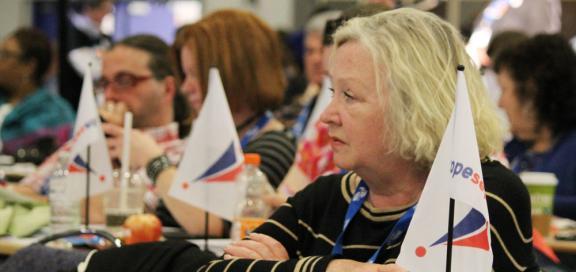Day two of the Canadian Labour Congress Convention was themed “Creating a Better Tomorrow, For Everyone”. Delegates looked at how public policy impacts Canada’s workforce and economy and making an argument for a fair taxation system.
On a morning panel moderated by Toronto TV host Tracy Moore, Ryerson Politics and Public Administration Professor Grace-Edward Galabuz, Diana Gibson of Canadians for Tax Fairness, and Laure Waridel of Equiterre shared their thoughts.
Galabuz said the economic system we have isn’t working for the majority of Canadians: “Increasingly we’re all coming to the same conclusion: we’ve built an economy that’s upside-down. The economy is a human institution. The economy should be built in a way that serves the people.”
“The top 1 per cent have got more than 95 per cent of the gains…I recognize that as a crisis,” he added.
Gibson agreed: “Suddenly [Canadians] are starting to understand that this economic system is benefiting the wealthy and corporations disproportionately.”
Waridel added that the current economic model doesn’t work because it is considered separate from its social and environmental impacts.
Galabuz said the right wing has been working “to reverse the idea of progress, to reverse the idea that we are each others’ keeper, and to push the idea that there is no community; we are just free agents.”
“We have to reject that,” he concluded.
Gibson said the discussions are starting in working families but need to continue: “This is now kitchen conversation and we need to make sure that conversation happens all the time about calling out those injustices.”
He urged the labour movement to focus on young people and unorganized people from diverse groups.
“We have to think about what happens in the community and people’s lives at home,” he said.
In the afternoon delegates looked more at how we engage diverse communities by discussing a report: Setting the Stage for Union Renewal: Changing Demographics in the Workforce. The report begins by noting that “newcomers to Canada, Aboriginal peoples, youth, racialized employees, and persons with disabilities represent some of the largest groups of currently unorganized workers who stand to benefit from the union advantage.”
Delegates passed the report’s recommendations, which define the labour movement’s objectives and ask unions to support progressive immigration policies, including an end to employers’ exploitation of temporary foreign workers; form strategic alliances with immigrant organizations and diverse communities; implement member education initiatives; and demand comprehensive training and apprenticeship programs to recruit and train diverse workers.
Many B.C. delegates spoke on the next resolution, which defined the CLC’s position on migrant workers, including the Temporary Foreign Workers program.
BC Federation of Labour President Jim Sinclair took to a microphone to share our experience in B.C.
“Unemployment in B.C. is higher because of this program and wages are lower…We have to be clear to those workers who are here in Canada today: Sisters and brothers, if you’re good enough to come here and work here, you’re good enough to live here.”
Now that the government has passed a partial moratorium on the program, Sinclair cautioned the problem still remains.
He said what’s needed is for the government is to “kill the program at the bottom end, stop abusing it, and allow people to come here as citizens with full rights in this country.”
Another resolution called on the labour movement to better reflect Canada’s diversity. The resolution, which passed, commits the CLC to continue to work to build a strong practice of equity and inclusion at all levels of the labour movement in Canada by steps such as: developing a mentorship program for women, to include women from equity-seeking groups (racialized women, Aboriginal women, LGBTQ women, women with disabilities, etc.); and strengthening coalition work with activists to identify and support organizing of precarious workers.
After that debate, another panel specifically discussed the role of public services in creating a more prosperous economy and stronger society.
The panel included Dr. Cindy Blackstock, executive director of the First Nations Child and Family Caring Society of Canada; Canadian Medical Association President Dr. Louis Hugo Francescutti; and University of Quebec at Montreal economist Dr. Pierre Fortin.
Blackstock spoke passionately about the continuing crisis facing First Nations children, noting there are even more First Nations children in foster care than there were at the height of residential schools.
“Reconciliation is not saying sorry twice, and the Canadian government still continues to discriminate against First Nations children…[the federal and provincial governments] underfund these services by a dramatic amount, putting a severe wait on the hopes and dreams of these children, generation after generation,” said Blackstock.
She said she was uplifted to see so many unions across Canada standing up to support First Nations organizations on these issues and urged union members to support two campaigns: Shannen’s Dream and Jordan’s Principle.
“It’s up to every single one of us to make a difference; the children are depending on each and every one of you…to stand up and make them feel proud of their country.”
Fortin focused on his research on the benefits of Quebec’s universal childcare system to the economy.
He said if we want a similar system across Canada, we need to win that “by showing repeatedly it will be good for children, it will be good for women, and it will be good for government finances.”
“It will have to be repeated because most people believe that a national child care program would be extremely expensive. It’s the opposite; they are going to make money out of it. But the most important thing is not money; its children and mothers,” Fortin added.
Francescutti talked about the Canadian health care system and how we need to rethink the way we deal with our growing health care needs.
“Most people think that the health care system make you healthy. It does make you healthy, but only about 25-30 per cent. The things that make you healthy have nothing to do with the health care system; they’re the social determinants of health,” Francescutti argued.
“In our emergency department, all we treat is failure after failure of society,” he said.
He said we need to look at a fairer society and especially investment in early childhood development to really start improving the health of Canadians.
At the end of the day, delegates took time to debate and pass resolutions supporting the public health care system and quality, universal, public child care.



